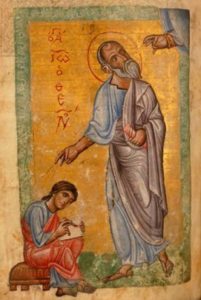By: Brian Chilton | July 17, 2017
In the New Testament, thirteen letters are attributed to the apostle Paul. Paul is, of course, the individual who had persecuted the church, but became a Christian missionary after an encounter with the risen Jesus on the road to Damascus. But, did Paul actually author all thirteen epistles believed to have been penned by him? Some believe that Paul only actually authored seven of the thirteen.
Epistles are ancient letters written to individuals or groups of individuals addressing particular theological issues and/or doctrinal problems. The thirteen letters classically attributed to the apostle Paul are Romans, 1 and 2 Corinthians, Galatians, Ephesians, Philippians, Colossians, 1 and 2 Thessalonians, 1 and 2 Timothy, Titus, and Philemon. Of the thirteen letters, seven are recognized as being undisputed (that is, without debate). Those seven undisputed letters are Romans, 1 and 2 Corinthians, Galatians, Philippians, 1 Thessalonians, and Philemon. But what of the other six (Ephesians, Colossians, 2 Thessalonians, 1 and 2 Timothy, and Titus)?
Some scholars have called the disputed six letters of Paul the “deutero-Pauline” epistles.[1] It is believed by some that these letters may have been written by someone who was influenced by Paul’s doctrine and wrote what they thought Paul would have said on certain issues.
Skeptics of the disputed letters hold several reasons for their disbelief. First, they claim that the history presented in the disputed letters do not match what one finds in the book of Acts. For example, Paul leaves Timothy in Ephesus in 1 Timothy 1:3 and leaves Titus in Crete in Titus 1:5. Such events are not found in Acts.
The vocabulary, it is argued, is much different in the disputed letters than in the undisputed letters of Paul. Drake Williams notes that the skeptic argues that “Approximately one third of the vocabulary within the Pastoral Letters is not found anywhere else in Paul’s letters, and over 35 names are not found elsewhere in Paul’s writings. Many of these words, however, can be found within second-century writings (Harrison, Problem).[2]
In addition, skeptics argue that the development of church structure is more advanced in the disputed letters than the undisputed letters; doctrinal issues seem to point towards a later date (including some apparent allusions to Gnosticism); and the stylistic differences between the undisputed and disputed letters all illustrate their cause for dismissing Paul as the author of the disputed texts.
Despite the objections offered, one possesses good reasons for accepting all thirteen letters attributed to Paul as authentic. I have never been convinced that the disputed letters were forged. Here are a few reasons why.
The Appearance of the Apostle’s Name on All the Letters
The first point does not necessarily prove Paul to be the author of the disputed letters. In fact, the authors of the Gnostic second-century letters erroneously attributed them to apostolic origin. Nevertheless, it is quite odd that all thirteen letters would have received approval from those closest to Paul if the letters had not actually been written or dictated by him. The letters are certainly early enough to have been tested for authenticity as many early church leaders quoted from the disputed letters as well as the undisputed letters, as we will discuss a little later.
At times, skeptical claims can be a bit inconsistent when applied to biblical authorship. Some scholars deny the traditional authorship of the Gospels because they are anonymous while also denying the traditional authorship of the Epistles because they are not anonymous. How bizarre!
Differing Circumstances Account for Differing Theological Emphases
It must be remembered that Paul encountered various issues in differing locations. The church of Corinth faced tumultuous circumstances with doctrinal issues and infidelity. Thus, the letters to Corinth would differ from the letters written to Galatia where they were bombarded by individuals who attempted to steer believers away from the idea that the grace of God alone was sufficient for salvation. These differences are recognized among the undisputed letters. So then why would one not account for some differences in emphasis with letters written to individuals like Timothy and Titus, especially if one allows for the idea that Paul wrote the later letters from a prison cell?[3]
The Use of Amanuenses Account for Stylistic Differences
 When I first learned the scribal practices of the amanuensis, I realized the stylistic differences in the different Pauline epistles were easily resolved. One may see stylistic differences even among the undisputed letters of Paul for the same reason. An amanuensis was a scribe who penned a letter as the author was dictating the message to him. The amanuensis would read back the letter to the author to ensure the message was as the orator desired. Scholars have noted that amanuenses were often allowed some liberty in the structure of their writing so long as the message was preserved.
When I first learned the scribal practices of the amanuensis, I realized the stylistic differences in the different Pauline epistles were easily resolved. One may see stylistic differences even among the undisputed letters of Paul for the same reason. An amanuensis was a scribe who penned a letter as the author was dictating the message to him. The amanuensis would read back the letter to the author to ensure the message was as the orator desired. Scholars have noted that amanuenses were often allowed some liberty in the structure of their writing so long as the message was preserved.
In the undisputed letters, one finds evidence of the amanuensis’s involvement. Take Romans, for instance. The letter begins by stating, “Paul, a servant of Christ Jesus, called an apostle and set apart for the gospel of God” (Romans 1:1).[4] Yet, at the end of the letter, one reads, “I Tertius, who wrote this letter, greet you in the Lord” (Romans 16:22). What’s going on here?
Well, it’s simple really. Paul authored the letter while Tertius was the amanuensis. Paul dictated the information to Tertius, who wrote down the message of Paul and read it back to Paul to ensure that it encapsulated the message desired. In my humble opinion, I think the practice was used by the Holy Spirit to make the epistles even better than they would have been if only one hand was involved. Evidences for the amanuensis imprint are found in 1 Corinthians 1:1 and 1 Corinthians 16:21, 2 Corinthians 1:1, Ephesians 6:21, Colossians 1:1, among many other places.
The Absence of Evidence is not Evidence of Absence
The so-called problem with the historical differences between the disputed epistles and the book of Acts is easily solved when one realizes that Luke did not provide an exhaustive history of the church in his sequel. That is to say, Luke did not document every event that took place in early church history. In like manner, the Gospels do not provide an exhaustive biography of the life of Jesus. As one of my former professors, Dr. R. Wayne Stacy denoted, “The Gospels provide us portraits of Jesus rather than photographs.” I like that analogy. John even admits as much when he writes that “There are also many other things that Jesus did, which, if every one of them were written down, I suppose not even the world itself could contain the books that would be written” (John 21:25).
When one examines Acts with the epistles, there is no problem so long as the two do not contradict each other. These differences can easily be dispelled when one acknowledges the intentional gaps in Luke’s history.[5]
Early Church Father Quotations from the Disputed Letters
The early church unanimously accepted all thirteen letters as authentic. Space will not allow a full treatment of this issue. However, let’s look at one disputed letter: Colossians. Early church leaders unanimously endorsed the letter as authentically Pauline. Irenaeus endorsed it in Against Heresies 3.14.1; Tertullian in De Praescr. Haer., 7; Clement of Alexandria in Strom., 1.1; as well as Justin Martyr in Dialogue with Trypho 85.2 and 138.2.
Evidence for Deacons and Elders in Undisputed Letters
Concerning the development of elders and deacons in the church, one must consider the role of leadership in the earliest church. Jesus himself divided his disciples into various groups. He chose seventy-two (or seventy) disciples and sent them out two by two. Of those seventy-two, Jesus had twelve primary disciples. Of those twelve, he chose three to be inner-circle disciples (Peter, James, and John). Therefore, even Jesus established a system for the church in the early going. In Acts 6, the disciples chose seven to serve. These seven are believed by many, including myself, to be the earliest deacons chosen to serve. Thus, with the system set in place by Jesus and the addition of deacons in Acts 6, it is no great leap to implement the offices of elders (i.e.,, pastors) and deacons in the church. Therefore, the idea that the offices of pastor and deacon represents a much later development in church history is greatly overblown.
The Rejection of Pseudonymous Letters by the Early Church (2 Thess. 2:2)
The early church flatly rejected pseudonymous letters. Ironically, 2 Thessalonians (a letter believed by some to be pseudonymous) admonishes believers to “not…be easily upset or troubled, either by a prophecy or by a message or by a letter supposedly from us, alleging that the day of the Lord has come” (2 Thessalonians 2:2).
Early church leaders emphasized the authenticity of Christian documents. Tertullian while teaching on his acceptance of complementarianism discredited a letter involving Paul and a woman named Thecla because it was falsely attributed to Paul.
Eusebius tells the story of Serapion. Serapion was the bishop of Antioch. Serapion chided the church at Rhosse in Cilicia for their use of the the apocryphal Gospel of Peter. Serapion wrote, “We brethren, receive both Peter and the other apostles as Christ; but we reject intelligently the writings falsely ascribed to them, knowing that such were not handed down to us.”[6]
Closeness in Proximity
Simply put, individuals closest in proximity to the writing of a document can know with more certainty who actually authored the document than those two-thousand years removed. This is especially true if the veracity of the document is stressed by early readers.
Conclusion
While this article is much longer than I hoped it would be, the importance of establishing the authenticity of Paul’s thirteen letters cannot be overemphasized. Did Paul write all thirteen of the letters attributed to him? Yes. He did with the help of amanuenses. With the points established in this article, one should have no reservation in accepting all thirteen letters. The only letter sometimes attributed to Paul that should be highly questioned for its Pauline origin is the book of Hebrews. No one really knows who wrote the book. However, it is accepted as authentic for reasons we will discuss in a future article. In fact, we will discuss the writers of the Pastoral Epistles next in our series on the authors of the New Testament.
Notes
[1] Drake Williams, “Paul the Apostle, Critical Issues,” The Lexham Bible Dictionary, John D. Barry, et. al., eds (Bellingham, WA: Lexham Press, 2016).
[2] Ibid.
[3] The idea that Gnosticism is found in the disputed letters is far-fetched in my opinion.
[4] Unless otherwise noted, all quoted Scripture comes from the Christian Standard Bible (Nashville: Holman, 2017).
[5] By gaps, I do not mean errors. Rather, Luke did not provide an exhaustive history and never intended to do so.
[6] Eusebius, Church History, 6.12.3.
About the Author:
 Brian Chilton is the founder of BellatorChristi.com and is the host of The Bellator Christi Podcast. He received his Master of Divinity in Theology from Liberty University (with high distinction); his Bachelor of Science in Religious Studies and Philosophy from Gardner-Webb University (with honors); and received certification in Christian Apologetics from Biola University. Brian has begun working on his Ph.D. in Theology and Apologetics at Liberty University. Brian is full member of the International Society of Christian Apologetics and the Christian Apologetics Alliance. Brian has been in the ministry for over 14 years and serves as the pastor of Huntsville Baptist Church in Yadkinville, North Carolina.
Brian Chilton is the founder of BellatorChristi.com and is the host of The Bellator Christi Podcast. He received his Master of Divinity in Theology from Liberty University (with high distinction); his Bachelor of Science in Religious Studies and Philosophy from Gardner-Webb University (with honors); and received certification in Christian Apologetics from Biola University. Brian has begun working on his Ph.D. in Theology and Apologetics at Liberty University. Brian is full member of the International Society of Christian Apologetics and the Christian Apologetics Alliance. Brian has been in the ministry for over 14 years and serves as the pastor of Huntsville Baptist Church in Yadkinville, North Carolina.
© 2017. Bellator Christi.com.






Is it really necessary to jump to the conclusion that if something wasn’t written by it’s named author but instead by a close disciple of the author, then it must be forgery? Bart Ehrman seems to jump too quickly to that conclusion. Now if a work were written by someone who never met the named author then one could definitely say it’s forgery.
I think you bring up a great point. Even if something is a collaborative work, that does not mean the author wasn’t involved in the book’s composition. When we consider the use of secretaries and scribes, then we can deduce that collaborations were more commonplace even among the most literate in society. Scribes were professional wordsmiths; artists with the written word.
Dr. Chilton
yes the information contained therein was informative thanks and looking forward to more
I am glad it was beneficial. Blessings!
Brian, thank you for this analysis. It was really helpful. Did anything ever come of the podcast possibility? Also, are you on X?
Could you remind me about the podcast we were going to record? I am on X (Twitter), but I rarely use the platform.
Thank you for this. I have been wondering lately about the authorship of the Pauline epistles, particularly the book of Ephesians. What you say here makes sense to me. 🙂
I don’t know if you received my comment that I left here on your blog a couple or more weeks ago, about why I have not responded to your email regarding a podcast? I have had two surgeries within the past two months, the most recent surgery was one week ago today. Between that, plus a few other things going on in my family recently, I just haven’t had the mental or emotional ability to add one more thing to my plate. I’m very sorry. I’m hoping and praying that things will be back to “normal” in my world, very soon.
God bless.
Thanks! I did receive your post. Just let me know when you are ready. I hope you are recovering well.
Blessings,
Brian